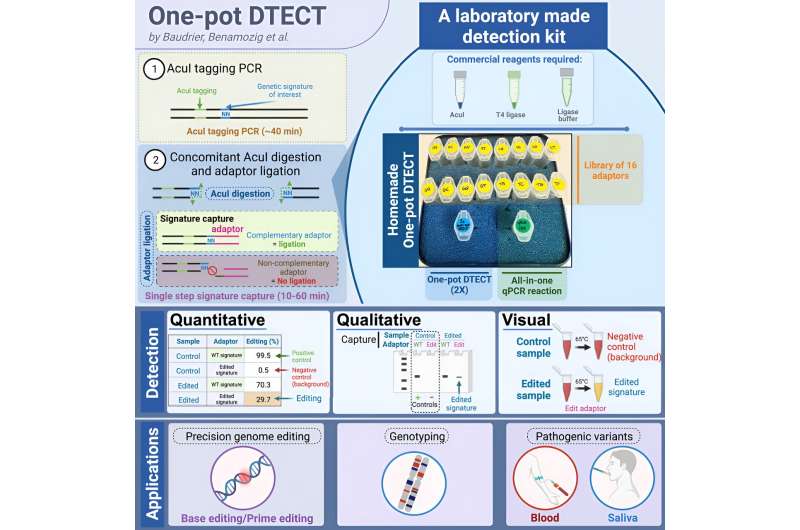This article has been reviewed according to Science X's editorial process and policies. Editors have highlighted the following attributes while ensuring the content's credibility:
fact-checked
peer-reviewed publication
trusted source
proofread
Researchers create a new tool to rapidly diagnose genetic mutations

Dr. Pierre Billon, Ph.D., was frustrated with the time it took to get genetic analysis done at specialized private labs. The results of the DNA samples that he needed for his research weren't available for weeks and sometimes months. Outsourcing to genome facilities was also expensive.
Billon was convinced there was another approach that could provide results faster and in a more cost-effective way. With the help of his Research Associate, Lou Baudrier, and visiting student researcher, Orléna Benamozig, they conceived and demonstrated a way to do it.
"We've developed a method which is so simple to implement and use that any lab, anywhere in the world, can readily establish their own kit, to achieve a same-day analysis of genetic mutations for a few cents per sample," says Billon, assistant professor at the Cumming School of Medicine (CSM). "We're really excited at our homemade system's capabilities and its versatility for various applications in the clinical setting."
The system, called One-pot DTECT, is a compact kit containing multiple enzymes and unique DNA fragments that reveal and detect genetic signatures. The genetic data can be analyzed in three ways: quantitatively, qualitatively, and visually.
"One-pot DTECT can confirm the presence of variants and determine the frequency of these mutations precisely," says Billon. "Accurate detection of genomic sequences and their mutations is critical for various applications in research and clinical settings."
To demonstrate the accuracy in the clinical context, the researchers contacted Dr. Nicola Wright, BSc '94, MD '97, a pediatric hematologist and immunologist at the Alberta Children's Hospital. One of Wright's areas of expertise is blood disorders, such as sickle cell anemia, which is caused by genetic mutations.
To test whether One-pot DTECT could be effective as a rapid point-of-care diagnostic tool, the researchers conducted a blind study. It involved 21 people: sickle cell anemia patients, people who are carriers of the mutation but do not have the condition, and controls, people without the mutation. The results, detected within the same day, were what the researchers hoped for.
"Our kit identified the various genetic signatures and clearly distinguished affected individuals from carriers and controls with 100 percent accuracy and zero percent false positives or false negatives," says Billon.
The researchers also confirmed the kit can be used on tiny amounts of DNA, like bloodspots.
"This has important application for diagnosing newborns and toddlers as it can be difficult to collect blood from children," says Wright, Barb Ibbotson Chair in Pediatric Hematology. "Bloodspots are easier to obtain, and early and accurate diagnosis is crucial for initiating appropriate management and treatment strategies,"
Billon adds. The kit can be used to diagnose a wide range of genetic mutations for blood and other disorders, including cystic fibrosis. Additional details of the methods used to test One-pot DTECT are published in Cell Reports Methods.
Billon, Baudrier, and Benamozig have a patent application in the process through Innovate Calgary, the university's knowledge transfer and business incubator center, which is actively engaging with industry partners for licensing One-pot DTECT to make it available to scientists, clinicians, and patients who need it. Billon developed the original version of One-pot DTECT when he was a post-doc at Columbia University in New York. They filed the first patent application there.
More information: Lou Baudrier et al, One-pot DTECT enables rapid and efficient capture of genetic signatures for precision genome editing and clinical diagnostics, Cell Reports Methods (2024). DOI: 10.1016/j.crmeth.2024.100698




















